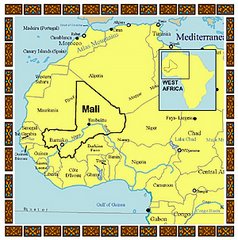Aw San bee San bee!!! Seasons greetings from the Tabaski festival in M'Pedougou. I find it a wonderful change from the consumer feeding frenzy in the U.S., the endless Christmas sales, the loops of warbling carols following you down the blue fluorescent aisles of Target on Christmas Eve as you desperately grab stuff to use as stocking stuffers.
No, none of that here. The season here revolves around the Muslim holiday of Tabaski, or the festival of sheep, which falls exactly two moon cycles and ten days after the end of Ramadan. I was in Bamako for the preparations (the tailors working around the clock while flocks of sheep clogging the roads), and after my whirlwind week of meeting filmmakers, I was in a rush to get back to village before the festivities began.
Getting from the Peace Corps office in Bamako to the bus station is a 4 dollar cab ride across Bamako or a succession of 10 cent bush taxis that are crowded, slow, indirect, but a whole lot more adventure for the money. I've figured out how to navigate the system enough to take 2 hours to cross a distance that takes a taxi 15 minutes, in what I call the scenic tour of Bamako. At the grand marche I have to get off and switch cars, and the market swallows me whole, only consenting to spit me out after an hour of churning through its intestines. By the time I get to the main bus station I'm thoroughly digested. I buy some bananas, a bus ticket, and collapse on a bench to wait.
As I drift off into visions of sugar plums, a voice interupts, "Hey, you're a Sikasso Peace Corps volunteer, aren't you?" (in Bambara of course). "Yes,... do I know you?" It's a guy who lives in Sikasso and has seen me around before. He plops down on the bench and we start chatting in mixed French and Bambara. Pretty soon a crowd of young 20-somethings going home for Tabaski begins to gather; when they hear the white girl speaking Bambara, the cat's out of the bag. Three hours later we finally line up for the bus, and I realize that I forgot to buy a gift for my host family. I see a bulging cart of watermelons and buy a nice fat one to give as a treat to the kids. As we're getting on the bus one of my new friends, Sunkalo, asks me "So, we're going to eat the watermelon on the bus?" I laugh, "No, it's for my host family." The bus is crowded, the air crackling with the energy of kids going home for the holidays. I wedge myself into a seat between my bag, my melon, and my bags of fruit, and I comment "This watermelon has become a bit of a problem." Sunkalo retorts, " I know how to solve it!" But we find a place for it on a luggage shelf tucked behind a pile of bags.
Normally I attempt to read an entire book on the 8 hour bus ride from Bamako to Sikasso, but this ride is different. My seat partners are unparalleled. Relishing the chance to use my French, we launch into discussions of religion and the existence of God, the problem of the soul in light of evolution (do monkeys have souls, and if not, when did the soul arise?), polygamy and how women 'share' their husbands. A few hours into the ride Sunkalo, who is seated farther up in the bus, stands up and makes a mock speech to parliament, (fellow countrymen,...), making a motion that the watermelon be 'broken' and eaten. The entire front half of the bus cheers and starts chanting "Zeray, zeray, zeray" (Bambara: watermelon), stomping and building in volume. I laugh and ask if they have a knife. Sunkalo says no, he's just playing. I can save the watermelon for my host family. A little later the chanting erupts again, the zeray having become a bus-wide joke.
By this time it is dark and people are beginning to get off the bus as we pass their villages. And with them go their bags... In all the chaos and conversation I'm not paying attention to the little shelf holding the prized possession. We stop in a big village and quite a few people get off. The bus lurches forward into the thick, dusty darkness, and I hear (as if in slow motion) a rolling, then a distinct, squelching thump. The odor, sweet and fresh, hits us just before the bus driver flips the lights on to reveal the exposed red flesh of the sacred zeray. Both sides are up (we must have passed through a Murphy-free zone), broken in two clean halves. There is a brief moment of concern, a second glance my way to gauge my reaction, before I yell "Someone get a knife!" and soon wet, shining slices of zeray are floating around the bus, seeds and rinds flying out the windows and into our laps, the juice streaming down our dusty faces. As I bite into my own oversized slice (like the birthday girl who gets the big piece of cake) the bus erupts into a new cheer: "Sita! Sita! Sita!" (my Malian name). Best piece of watermelon I've ever had.
When I get off the bus I say my goodbyes, exchange phone numbers, fend off marriage proposals, and promise to call my friends when I return to the big cities. I heft my backpack and walk to my hut by moonlight, my face glowing.
Subscribe to:
Post Comments (Atom)



1 comment:
what is sita?
Post a Comment